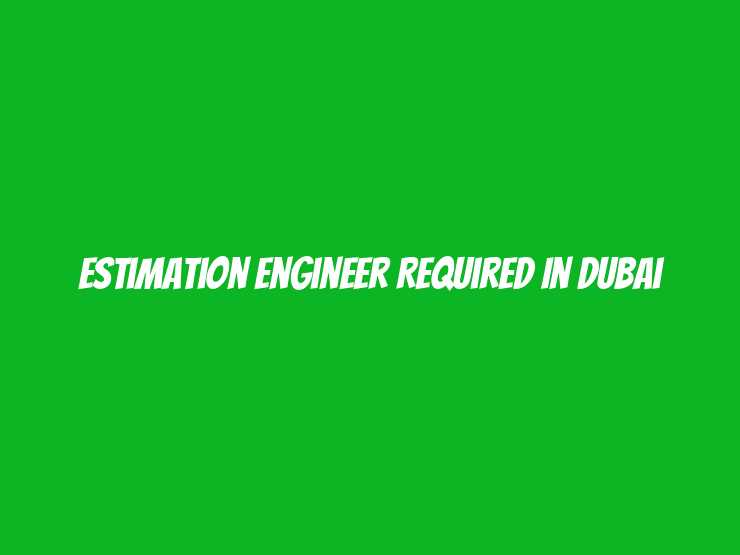An Estimation Engineer is responsible for calculating the costs associated with construction or manufacturing projects, ensuring that projects remain within budgetary constraints while meeting client specifications. They analyze project requirements, estimate material, labor, and equipment costs, and prepare detailed cost proposals. Estimation Engineers are integral to the planning phase, working closely with project managers, engineers, and contractors to determine the financial feasibility of projects. They may be involved in various industries such as construction, manufacturing, infrastructure development, and engineering services.
| Salary | Market Competitive |
| Experience | 4 Years |
| Location | Dubai |
| Qualification | Bachelor Degree in Engineering |
| Posted | 19 October 2024 |
| Job Type | Full-Time |
| Posted by | Habeebi Recruiter |
| last date to apply | apply within 15 days |
Key Responsibilities of an Estimation Engineer
1. Cost Estimation and Budgeting
The primary role of an Estimation Engineer is to develop accurate cost estimates for projects. This involves calculating the costs of materials, labor, equipment, and other expenses required to complete the project. They must also account for indirect costs such as overhead, transportation, and contingencies. Through careful analysis, the Estimation Engineer ensures that project costs remain within the allocated budget while still meeting quality standards and timelines.
2. Project Feasibility Analysis
Before any project begins, the Estimation Engineer assesses its financial viability. This involves conducting a detailed analysis of the project’s specifications, identifying any potential risks or cost overruns, and advising management on whether the project is feasible within the available budget. They also help clients understand the economic aspects of different project options and suggest cost-effective alternatives where possible.
3. Preparing Tender Documents and Proposals
Estimation Engineers are responsible for preparing comprehensive tender documents and cost proposals for clients or contractors. These documents include detailed breakdowns of costs, timelines, and resources required for the project. They also include any assumptions, exclusions, or terms that may affect the overall cost. Their work ensures that all stakeholders have a clear understanding of the financial aspects of the project before work begins.
4. Material and Resource Sourcing
In order to provide accurate cost estimates, an Estimation Engineer must be familiar with the sourcing of materials and resources. This involves evaluating suppliers, understanding market prices, and ensuring that the materials meet project specifications and quality standards. By staying informed about fluctuating market prices for materials, the Estimation Engineer can adjust estimates accordingly and avoid any unexpected cost increases.
5. Collaboration with Project Teams
Estimation Engineers work closely with project managers, design engineers, and contractors throughout the estimation and planning process. They provide financial insights that help the team make informed decisions regarding design changes, construction methods, and scheduling. By collaborating with different departments, they ensure that the project’s financial goals align with the overall objectives, minimizing the risk of cost overruns or delays.
6. Risk Analysis and Mitigation
Another critical responsibility of an Estimation Engineer is identifying and mitigating risks that may affect project costs. This includes anticipating price fluctuations, potential delays in material delivery, or changes in labor availability. The Estimation Engineer evaluates these risks and incorporates contingency plans or alternative solutions into the cost estimates, ensuring that the project remains financially viable even when unexpected challenges arise.
7. Monitoring and Adjusting Cost Estimates
Once the project begins, the Estimation Engineer may be involved in monitoring actual project costs compared to the original estimates. If discrepancies arise, they must adjust the estimates and work with the project team to make necessary changes to stay within budget. This ongoing analysis helps ensure financial control throughout the project lifecycle, minimizing the risk of cost overruns.
8. Post-Project Review and Reporting
After project completion, the Estimation Engineer performs a post-project review to compare the actual costs with the initial estimates. This helps identify any areas where cost estimation was inaccurate, and the lessons learned can be applied to future projects. The Estimation Engineer compiles this data into reports for management, providing insights into the overall financial performance of the project.
Skills and Qualifications
- Technical Expertise: A solid understanding of engineering principles, construction methods, and manufacturing processes, along with experience in cost estimation software.
- Analytical Skills: The ability to analyze complex project specifications and translate them into detailed cost estimates.
- Attention to Detail: Precision is crucial when estimating costs to ensure the project stays within budget.
- Communication Skills: Ability to collaborate effectively with engineers, project managers, and clients, and to present cost estimates clearly and accurately.
- Market Knowledge: Up-to-date knowledge of material prices, labor rates, and industry standards is essential to produce reliable estimates.
- Educational Background: A degree in civil engineering, mechanical engineering, or a related field is typically required, along with experience in cost estimation.
An Estimation Engineer plays a vital role in ensuring that construction and manufacturing projects are financially feasible and executed within budget. Their expertise in cost analysis, budgeting, and project feasibility is key to the successful delivery of projects while maintaining financial control and resource efficiency. Through collaboration and careful planning, Estimation Engineers help minimize financial risks and optimize project outcomes.
How to apply:
Send your updated resume to our email or directly reach us at our phone:
Email: support@tossround.com , sales@tossround.com
Phone: +971 58 169 2609 , +971 52 474 5525

